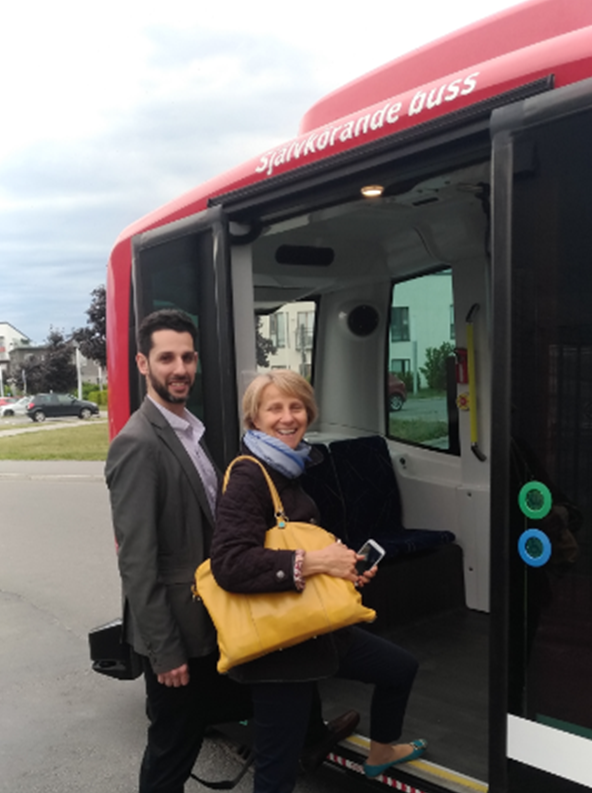Connected and Co-operative Automated Mobility (CCAM) is gaining more importance across Europe and beyond.
 Chair and Vice Chair, Dr. Nikolas THOMOPOULOS, and Prof. Cristina PRONELLO during the WISE-ACT meeting in Stockholm. Image Credit: COST Association.
Chair and Vice Chair, Dr. Nikolas THOMOPOULOS, and Prof. Cristina PRONELLO during the WISE-ACT meeting in Stockholm. Image Credit: COST Association.
This has been affirmed not only through the Sustainable Development Goals (SDGs) of the United Nations on the 2015 Paris agreement but also through the European Green Deal.
State of Play
Autonomous and Connected Transport trials are conducted across the world with a focus on Automated and Autonomous Vehicles (AVs), Mobility-as-a-Service (MaaS), Electric Vehicles (EVs), drones, etc.
Already, cities and private companies have entered the competition in this sector, including well-established worldwide companies like Tesla to small start-ups in remote parts of Europe. The field has made remarkable progress in the past five years but has led to an intense focus on the actual technology, ignoring the user element.
With the growing importance of data in this domain and the progress of Artificial Intelligence (AI), Europe should take important actions regarding broad problems like liability, governance, ethics and business models. The European Union has issued appropriate guidelines about AI and ethics in 2020, as it takes more time to draft the framework and guidelines regarding mobility and transport.
So far, there is only a limited study concerning the broad impacts of the deployment of such vehicles, the suitable infrastructure necessities, the length of the transition period and specifically regarding the human and environmental effects.
Wider Implications
In this aspect, the aim of WISE-ACT is to investigate the wider impacts of Connected and Cooperative Automated Mobility and to share the best practices on how to assess them. The Wider Impacts and Scenario Evaluation of Autonomous and Connected Transport, also called WISE-ACT COST Action, is a collaborative research network with nearly 200 experts in 42 countries.
The project was launched in 2017 and this brings together experts in Europe, Brazil, Australia, New Zealand, Canada and the United States to emphasize car sharing, travel behavior, travel time use and the future of public transport.
A key challenge for Autonomous and Connected Transport experts is to educate policymakers, businesses and citizens about the opportunities and challenges arising. This can be achieved through sharing best practices which facilitate the co-creation of our common future in urban and rural areas.
Dr. Nikolas Thomopoulos, Chair, WISE-ACT COST Action
The Action aims to find, review, develop and evaluate the framework, as sustainability has been its core objective. The AV trial database, started by WISE-ACT in 2017, is considered one of the most detailed databases, focusing to highlight the links of Autonomous and Connected Transport with sustainability. Together with the WISE-ACT Glossary, the WISE-ACT Atlas will be the two main outputs at the end of this Action.
In 2019, WISE-ACT came up with the Idea Jam competition, a special chance offered to join an international community of experts and work toward resolving the difficulties of Autonomous and Connected Transport. The competition attracted around 40 participants from 16 countries. The winners got the opportunity to present the solution to enable the co-existence of cyclists and autonomous vehicles in Paris, which extensively encourages active travel.
WISE-ACT provided chances for Early Career Researchers to experience AV trials first-hand by hosting Training Schools coordinated by the Technion and Aalto University in association with the European Institute and Technology Urban Mobility.
Other programs based on the reported contributions by Action participants worldwide involve the WISE-ACT survey and focus groups that were inaugurated before the COVID-19 pandemic and were finished during the COVID-19 lockdowns.
These activities extensively benefitted by the collaboration with the European Commission Joint Research Centre experts in Italy, which led to WISE-ACT providing a lot of questions utilized in a suitable Eurobarometer survey that was published in 2020.
Last June, Urbanism Next Europe, which investigates multi-level effects of developing technologies, was hosted in Rotterdam and provided a stage to exchange views regarding best practices from Asia, Europe, North and South America.
WISE-ACT conducted a session on how sustainability and road automation can co-exist in future urban transport.
The experts involved were Professor Bert van Wee, Professor Nick Reed, Wolfram Klar, and Dr. Wolfgang Backhaus who gave detailed views regarding ethical dilemmas and continuing city planning around Autonomous and Connected Transport.
WISE-ACT has been able to show that apart from the difficulties, the technology can help fulfill broader policy goals like sustainability while being inclusive.
Our Action activities have highlighted that despite the challenges, it is crucial to offer the opportunities for engineers and IT experts to collaborate with experts in the social sciences and humanities.
Dr. Tibor Petrov, Science and Communications Co-ordinator, WISE-ACT COST Action
“The WISE-ACT webinars have been a particularly rewarding experience for Early Career Researchers and those based in Inclusiveness Target Countries, where such silos are still dominant,” concluded Petrov.
Coming Up
The final conference of the Action is already being scheduled during the next EU Connected and Automated Driving Conference.